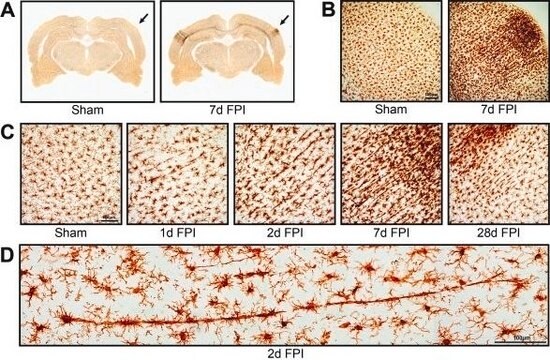SAB2702364
Monoclonal Anti-Iba1 antibody produced in mouse
clone GT10312, affinity isolated antibody
Sinónimos:
AIF-1, IBA1, IRT-1, IRT1
About This Item
Productos recomendados
biological source
mouse
Quality Level
conjugate
unconjugated
antibody form
affinity isolated antibody
antibody product type
primary antibodies
clone
GT10312, monoclonal
form
buffered aqueous solution
mol wt
17kDa
species reactivity
mouse, human, rat
concentration
2.03mg/mL
technique(s)
immunohistochemistry (formalin-fixed, paraffin-embedded sections): 1:100-1:1000
indirect immunofluorescence: suitable
western blot: 500-3000
isotype
IgG1
UniProt accession no.
shipped in
wet ice
storage temp.
−20°C
target post-translational modification
unmodified
Gene Information
human ... AIF1(199)
General description
Immunogen
Application
- in the double immunofluorescence
- in the immunofluorescence
- in immunohistochemistry
Biochem/physiol Actions
Features and Benefits
Other Notes
Physical form
Disclaimer
¿No encuentra el producto adecuado?
Pruebe nuestro Herramienta de selección de productos.
Optional
Storage Class
10 - Combustible liquids
wgk_germany
WGK 1
flash_point_f
Not applicable
flash_point_c
Not applicable
Certificados de análisis (COA)
Busque Certificados de análisis (COA) introduciendo el número de lote del producto. Los números de lote se encuentran en la etiqueta del producto después de las palabras «Lot» o «Batch»
¿Ya tiene este producto?
Encuentre la documentación para los productos que ha comprado recientemente en la Biblioteca de documentos.
Los clientes también vieron
Nuestro equipo de científicos tiene experiencia en todas las áreas de investigación: Ciencias de la vida, Ciencia de los materiales, Síntesis química, Cromatografía, Analítica y muchas otras.
Póngase en contacto con el Servicio técnico












